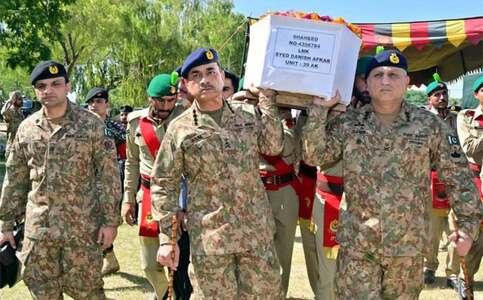ISLAMABAD: National Security Adviser retired Lt Gen Nasser Janjua counselled on Monday a cool-headed approach in dealing with Afghanistan so as to thwart the “Indian design” of pushing Pakistan into a two-front conflict situation.
“A two-front situation is developing. It shouldn’t be allowed to happen. We should not think about Afghanistan with anger and must work to fix the relationship,” Gen Janjua said while talking to reporters after inaugurating a conference on ‘Maritime Security in the Indian Ocean: Challenges and Prospects for Pakistan’ jointly organised by the Centre for Pakistan and Gulf Studies (CPGS), German Foundation Konrad Adenauer Stiftung and Bahria University’s National Centre for Maritime Policy Research.
It should be recalled that the army had angrily shut down Pakistan’s border crossings with Afghanistan after an uptick of violence in the country in February that was blamed on sanctuaries on Afghan soil.
The crossings were finally reopened last week following mediation by Britain that resulted in an agreement on counterterrorism cooperation, whose details haven’t been made public.
Janjua defends Raheel as head of Saudi-led military alliance
The border closure not only resulted in huge economic losses in both countries, but also tarnished Afghan opinion about Pakistan. “If our vision is to become a massive trade corridor, there is no other option but to mend ties with Afghanistan. Your future is connected with it,” Gen Janjua emphasised.
Pakistan cut a sorry figure at the Economic Cooperation Organisation summit it hosted earlier this month, which concluded with calls for improving regional connectivity and enhancing trade, at a time when trade routes between Pakistan and Afghanistan remained shut.
“If India is creating a two-front situation for us, it will face a similar dilemma also and that would be more difficult for it to handle,” he said with reference to growing Pakistan-China cooperation.
Speaking at the conference, Mr Janjua said it was Pakistan’s policy to promote positivities in ties with regional countries. “We believe in cooperation rather than competition.”
He spoke about threats to peace in Afro-Asian Ocean, more commonly called the Indian Ocean, particularly from the India-US logistics exchange agreement.
“This agreement is of particular significance because India and the US have through it carved out a space to pre-position in the ocean,” he said, adding that the United States had in this region and Asia-Pacific cumulatively over 360,000 troops, in addition to the Indian military strength.
This is straining the regional stability and security architecture.
Mr Janjua defended the government’s decision to allow former army chief retired Gen Raheel Sharif to head the Saudi-led military alliance of Muslim states, saying he (Gen Sharif) is a man of great understanding and would maintain the required delicate balance.
He said Iran shouldn’t feel concerned about Gen Sharif joining the coalition because he would be better than someone with ‘fixed thinking’ leading it.
Defence Production Minister Rana Tanveer Hussain, former naval chief retired Admiral Asif Sandila and CPGS president Senator Sehar Kamran also spoke.
The conference concluded with 25 recommendations, including revamping of the maritime policy to make it compatible with emerging challenges, strengthening of navy for dealing with security challenges and strengthening ties with regional countries, including India.
Published in Dawn, March 28th, 2017















































Dear visitor, the comments section is undergoing an overhaul and will return soon.